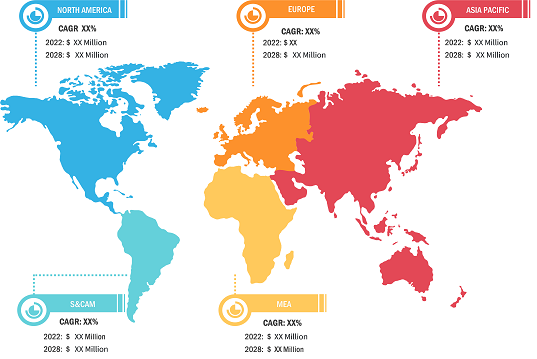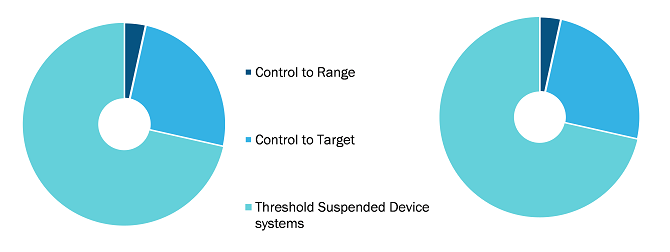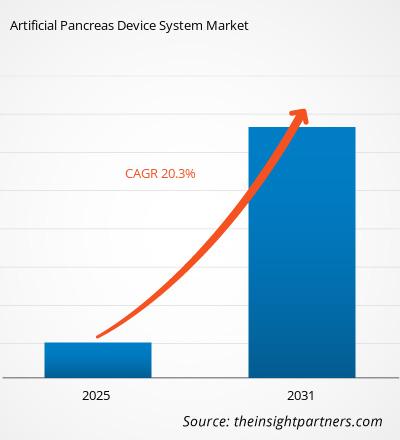人工膵臓デバイス システム市場は、2031 年までに 35 億 8,575 万米ドルに達すると予測されています。 2022年には11億9,023万人。 2022 年から 2031 年にかけて 20.28% の CAGR で成長すると推定されています。
人工膵臓デバイス システムは、適合した膵臓のグルコース調節機能を厳密にコピーします。このデバイスは体内の血糖値を監視するだけでなく、インスリンの分布を自動的に調整して血糖値を下げ、患者からの入力が少ないかまったくなくても低血糖の発生率を下げます。米国食品医薬品局によると、人工膵臓の使用は、標準治療と比較して 1 型糖尿病患者の血糖値のコントロールに効果があるとのことです。
人工膵臓デバイスシステム市場は、種類と地域に基づいて分割されています。地理に基づいて、市場は北米、ヨーロッパ、アジア太平洋、中東、およびアジア太平洋地域に大きく分類されます。アフリカ、そして南と南。中米。このレポートは、世界をリードする市場プレーヤーの競争環境の分析とともに、市場動向、技術の進歩、市場のダイナミクスなどのパラメーターに重点を置き、市場の洞察と詳細な分析を提供します。
戦略的洞察
人工膵臓デバイスシステム市場にとって有利な地域< /span>

マーケット インサイト
糖尿病有病率の増加が人工膵臓デバイス システム市場を促進< /h3>
糖尿病は、特別な治療法がない、生命を脅かす慢性疾患です。この病気は主に、体がホルモンのインスリンを生成または効果的に利用できないことによって引き起こされます。これは 21st 世紀で最大規模の世界規模の健康上の緊急事態の 1 つです。糖尿病は、体が血糖値を適切に調節することを妨げます。糖尿病には、I 型糖尿病 (尿崩症とも呼ばれます) と II 型糖尿病 (真性糖尿病とも呼ばれます) の 2 つのタイプがあります。肥満、座りっぱなしのライフスタイル、不健康な食習慣は、糖尿病人口の急速な増加に関連する主要な危険因子です。
国際糖尿病連盟 (IDF) によると、北米では糖尿病患者の数が 2017 年の約 4,600 万人から 2045 年までに約 6,200 万人に増加すると予想されています。病気の有病率は予測期間中に最大 35% 急増する可能性があります。米国糖尿病協会によると、約 3,030 万人、つまり米国人口の最大 9.4% が糖尿病に苦しんでいます。このうち、2017 年には 125 万人の子供が I 型糖尿病を患っていました。国立衛生研究所はまた、I 型糖尿病の発生率が世界中で急速に増加しており、かなりの数の子供や十代の若者が罹患していると述べています。同じ情報源によると、2017 年には東南アジアで約 8,400 万人が糖尿病に苦しんでいます。これらの患者のうち、149,300 人の子供が I 型糖尿病に苦しんでおり、毎日のインスリン注射が必要です。 2 型糖尿病は糖尿病の中で最も蔓延している形態であり、文化的および社会的変化とともに増加しています。高所得国では、糖尿病成人の最大 91% が 2 型糖尿病を患っています。 IDF によると、2017 年には世界で約 4 億 2,500 万人が糖尿病を抱えており、その数は 2045 年までに 6 億 2,900 万人に達すると予想されています。
あらゆる種類の糖尿病は、体の多くの部分にさまざまな合併症を引き起こす可能性があり、全体的な早死のリスクを高める可能性があります。この病気に関連する主な合併症は、心臓発作、脳卒中、腎不全、下肢切断、視力喪失、神経損傷です。糖尿病に苦しむ患者には、頻繁なモニタリングと外部インスリン投与が必要です。
>タイプに関する洞察
タイプに基づいて、人工膵臓デバイスシステム市場は、範囲制御、ターゲット制御、および閾値サスペンドデバイスシステムに分類されます。 2022 年には、しきい値一時停止デバイス システム部門が市場で最大のシェアを獲得しました。このセグメントはさらに、2022 年から 2031 年にかけて最高の CAGR を記録すると予想されています。低血糖サスペンドシステムとも呼ばれる閾値サスペンドデバイスシステムでは、血糖値が指定された低レベルを 2 つ下回ると、低血糖を示し、インスリンの送達が一定時間停止されます。閾値停止デバイスは、血糖値の低下を逆転させるのに役立ちます。低グルコースサスペンドシステムとも呼ばれる閾値サスペンドデバイスシステムを使用すると、グルコースレベルが指定された低レベルを 2 つ下回ると、インスリンの送達が設定時間中断されます。しきい値で停止されたデバイスは、低血糖(低血糖)イベントに応答できません。
タイプ別人工膵臓デバイス システム市場 – 2022 年と 2031 年

製品の発売と合併と買収は、企業がよく採用する戦略です。世界の人工膵臓デバイスシステム市場で事業を展開している企業。最近の主要な製品開発のいくつかを以下に示します。
- 2021 年 6 月、メドトロニックは、7 歳から 80 歳までの 1 型糖尿病患者を治療する MiniMed 780G システムの CE マークを取得しました。
- 2022 年 4 月、アボットはイプソメッド社、CamDiab 社と協力して人工膵臓システムをヨーロッパに導入しました。
- 2021 年 1 月、メドトロニックは英国で MiniMed 780G システムを発売しました。これは、7 ~ 80 歳の人々の 1 型糖尿病の管理に使用される、高度なハイブリッド クローズド ループ インスリン送達システムです。
人工膵臓デバイス システム市場 –市場セグメンテーション
種類の点では、人工膵臓デバイスシステム市場は、制御から範囲、制御からターゲット、および閾値サスペンドデバイスシステムに分類されます。地理に基づいて、市場は北米(米国、カナダ、メキシコ)、ヨーロッパ(フランス、ドイツ、英国、イタリア、スペイン、その他のヨーロッパ)、アジア太平洋(中国、日本、インド、オーストラリア、韓国)に分割されます。 、およびその他のアジア太平洋地域)、中東およびその他の地域)アフリカ(サウジアラビア、南アフリカ、UAE、およびその他の中東およびアフリカ)、南および中央アメリカ(ブラジル、アルゼンチン、およびその他の南および中央アメリカ)
会社概要
- 定義を否定
- Typezero Technologies, Inc
- インシュレット株式会社
- Bigfoot Biomedical, Inc
- メドトロニック
- Dexcom, Inc
- アドメシス
- ベータ バイオニクス
- セルノボ
- Tandem Diabetes Care, Inc
- 過去2年間の分析、基準年、CAGRによる予測(7年間)
- PEST分析とSWOT分析
- 市場規模価値/数量 - 世界、地域、国
- 業界と競争環境
- Excel データセット

Report Coverage
Revenue forecast, Company Analysis, Industry landscape, Growth factors, and Trends

Segment Covered
This text is related
to segments covered.

Regional Scope
North America, Europe, Asia Pacific, Middle East & Africa, South & Central America

Country Scope
This text is related
to country scope.
Trends and growth analysis reports related to Life Sciences : READ MORE..
The List of Companies
- Defymed
- TypeZero Technologies, Inc.
- Insulet Corporation
- Bigfoot Biomedical, Inc.
- Medtronic
- Dexcom, Inc.
- Admetsys
- Beta Bionics
- Cellnovo
- Tandem Diabetes Care
The Insight Partners performs research in 4 major stages: Data Collection & Secondary Research, Primary Research, Data Analysis and Data Triangulation & Final Review.
- Data Collection and Secondary Research:
As a market research and consulting firm operating from a decade, we have published and advised several client across the globe. First step for any study will start with an assessment of currently available data and insights from existing reports. Further, historical and current market information is collected from Investor Presentations, Annual Reports, SEC Filings, etc., and other information related to company’s performance and market positioning are gathered from Paid Databases (Factiva, Hoovers, and Reuters) and various other publications available in public domain.
Several associations trade associates, technical forums, institutes, societies and organization are accessed to gain technical as well as market related insights through their publications such as research papers, blogs and press releases related to the studies are referred to get cues about the market. Further, white papers, journals, magazines, and other news articles published in last 3 years are scrutinized and analyzed to understand the current market trends.
- Primary Research:
The primarily interview analysis comprise of data obtained from industry participants interview and answers to survey questions gathered by in-house primary team.
For primary research, interviews are conducted with industry experts/CEOs/Marketing Managers/VPs/Subject Matter Experts from both demand and supply side to get a 360-degree view of the market. The primary team conducts several interviews based on the complexity of the markets to understand the various market trends and dynamics which makes research more credible and precise.
A typical research interview fulfils the following functions:
- Provides first-hand information on the market size, market trends, growth trends, competitive landscape, and outlook
- Validates and strengthens in-house secondary research findings
- Develops the analysis team’s expertise and market understanding
Primary research involves email interactions and telephone interviews for each market, category, segment, and sub-segment across geographies. The participants who typically take part in such a process include, but are not limited to:
- Industry participants: VPs, business development managers, market intelligence managers and national sales managers
- Outside experts: Valuation experts, research analysts and key opinion leaders specializing in the electronics and semiconductor industry.
Below is the breakup of our primary respondents by company, designation, and region:

Once we receive the confirmation from primary research sources or primary respondents, we finalize the base year market estimation and forecast the data as per the macroeconomic and microeconomic factors assessed during data collection.
- Data Analysis:
Once data is validated through both secondary as well as primary respondents, we finalize the market estimations by hypothesis formulation and factor analysis at regional and country level.
- Macro-Economic Factor Analysis:
We analyse macroeconomic indicators such the gross domestic product (GDP), increase in the demand for goods and services across industries, technological advancement, regional economic growth, governmental policies, the influence of COVID-19, PEST analysis, and other aspects. This analysis aids in setting benchmarks for various nations/regions and approximating market splits. Additionally, the general trend of the aforementioned components aid in determining the market's development possibilities.
- Country Level Data:
Various factors that are especially aligned to the country are taken into account to determine the market size for a certain area and country, including the presence of vendors, such as headquarters and offices, the country's GDP, demand patterns, and industry growth. To comprehend the market dynamics for the nation, a number of growth variables, inhibitors, application areas, and current market trends are researched. The aforementioned elements aid in determining the country's overall market's growth potential.
- Company Profile:
The “Table of Contents” is formulated by listing and analyzing more than 25 - 30 companies operating in the market ecosystem across geographies. However, we profile only 10 companies as a standard practice in our syndicate reports. These 10 companies comprise leading, emerging, and regional players. Nonetheless, our analysis is not restricted to the 10 listed companies, we also analyze other companies present in the market to develop a holistic view and understand the prevailing trends. The “Company Profiles” section in the report covers key facts, business description, products & services, financial information, SWOT analysis, and key developments. The financial information presented is extracted from the annual reports and official documents of the publicly listed companies. Upon collecting the information for the sections of respective companies, we verify them via various primary sources and then compile the data in respective company profiles. The company level information helps us in deriving the base number as well as in forecasting the market size.
- Developing Base Number:
Aggregation of sales statistics (2020-2022) and macro-economic factor, and other secondary and primary research insights are utilized to arrive at base number and related market shares for 2022. The data gaps are identified in this step and relevant market data is analyzed, collected from paid primary interviews or databases. On finalizing the base year market size, forecasts are developed on the basis of macro-economic, industry and market growth factors and company level analysis.
- Data Triangulation and Final Review:
The market findings and base year market size calculations are validated from supply as well as demand side. Demand side validations are based on macro-economic factor analysis and benchmarks for respective regions and countries. In case of supply side validations, revenues of major companies are estimated (in case not available) based on industry benchmark, approximate number of employees, product portfolio, and primary interviews revenues are gathered. Further revenue from target product/service segment is assessed to avoid overshooting of market statistics. In case of heavy deviations between supply and demand side values, all thes steps are repeated to achieve synchronization.
We follow an iterative model, wherein we share our research findings with Subject Matter Experts (SME’s) and Key Opinion Leaders (KOLs) until consensus view of the market is not formulated – this model negates any drastic deviation in the opinions of experts. Only validated and universally acceptable research findings are quoted in our reports.
We have important check points that we use to validate our research findings – which we call – data triangulation, where we validate the information, we generate from secondary sources with primary interviews and then we re-validate with our internal data bases and Subject matter experts. This comprehensive model enables us to deliver high quality, reliable data in shortest possible time.



 このレポートの無料サンプルを入手する
このレポートの無料サンプルを入手する